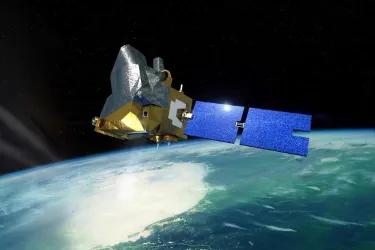The groundbreaking MicroCarb satellite marks a major milestone in the fight against climate change by providing more accurate climate data, experts say.
Revolutionary technology
Orbiting at 650km above the Earth, MicroCarb will observe the flow of carbon dioxide gas from natural and man-made sources and its absorption by the atmosphere, ocean and land.
The probe is equipped with revolutionary city-scanning technology to map atmospheric CO₂ emissions across urban areas the size of London and Paris a level of detail never achieved before.
This expertise is vital for understanding emissions from cities, which are responsible for more than 70 per cent of global CO₂ emissions, scientists say.
Accessible mapping
Researchers from the University of Edinburgh will translate the satellite’s CO₂ data into detailed publicly accessible maps showing carbon absorption and emissions.
The precise measurements will help verify climate targets and guide net zero strategies, providing governments with the data needed to track progress toward the Paris Agreement and develop effective carbon reduction policies.
Sinks and cycles
In addition to urban emissions, MicroCarb will monitor natural carbon sinks such as forests and oceans, enhancing scientists’ understanding of how much and where carbon is absorbed by the planet.
The data is essential for improving national carbon inventories and identifying new opportunities for carbon capture and storage, experts say.
MicroCarb will also measure Solar Induced Fluorescence (SIF), a faint glow plants give off during photosynthesis, which helps scientists track how much carbon plants absorb.
Tracking SIF offers valuable insights into the carbon cycle and helps differentiate plant from man-made CO₂ emissions.
Lift-off!
Having successfully launched aboard a Vega-C rocket from Kourou, French Guiana on Saturday 26 July, MicroCarb will join the international greenhouse gas virtual constellation of satellites, significantly enhancing global climate monitoring capabilities.
The project is a collaboration between the UK Space Agency, France’s space agency CNES and the National Centre for Earth Observation (NCEO).
Backed by a £15 million investment from the UK Space Agency, the mission also strengthens Britain’s position as a global leader in both climate science and space technology, leaders say.
Critical steps
As the world races to limit global warming to 1.5°C, MicroCarb represents a critical step in delivering the transparent, verifiable data needed to hold nations accountable and accelerate the transition to a low-carbon future, experts say.
MicroCarb’s first data is expected to be released in mid 2026, offering insights into major urban emitters and the performance of natural carbon sinks.
The findings will feed into international climate assessments and future satellite missions under the UK’s Earth Observation Roadmap.


